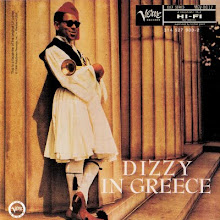
George Allen Russell (1923 - ), American jazz pianist, composer and theorist, is considered one of the first jazz musicians to contribute to general music theory with a theory of harmony based on Jazz rather than European music, in his 1953 book, The Lydian Chromatic Concept of Tonal Organization which paved the way for the modal revolutions of Miles Davis and John Coltrane. Russell's stylistic reach in his own compositions eventually became omnivorous, embracing bop, gospel, blues, rock, funk, contemporary classical elements, electronic music and African rhythms in his recent, ambitious extended works -- most apparent in his large-scale 1983 suite for an enlarged big band, The African Game. Like his colleague Gil Evans, Russell never stopped growing, but his work is not nearly as well-known that that of Evans, being more difficult to grasp and, in any case, not as well-documented by U.S. record labels.
We try to remedy this here with this magnificent 1978 session when Russell led a 19-piece big band at New York's Village Vanguard for six weeks, in a tremendously diverse performance displaying the many facets of his art -- including his first famous composition, the two-part "Cubano Be, Cubano Bop" written in 1947 for the Dizzy Gillespie Orchestra that served as a solid vehicle of that band's pioneering experiments in fusing bebop and Cuban jazz elements, enjoy.


4 comments:
Oh yes it does - thank you VERY much!
Great. Thanks.
Don't share it anymore? :-o
Post a Comment